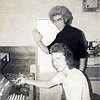What do you usually start with when working on mastering a new piece?
I load all the mixes in the order of the album. I then usually start with the loudest one, work out what’s required and master it; I then build up the rest of the album around my initial instincts. I can usually grasp what’s needed very quickly, and soon have a workflow in progress.
Certain sounds seem to be inextricably connected to particular genres or styles of music or even to different formats, like the CD or vinyl. Do you consider these as limitations, as a given or as a compositional tool which can be used in an inventive way?
No I don’t think these are limitations, and I’m known for being able to achieve those sounds, so some people come to me because they know I can help their project sound that way.
The line between production work and composition is blurring. In how much do you feel that these two areas could mutually influence and inspire each other?
I think it’s almost the other way round. Too much control can take away the raw talent of producing a creatively amazing piece. I also feel that someone who writes a piece of music doesn’t always see its true potential, which is where the right producer comes in.
Sometimes that extends to the mastering room as well. In 2001 I mastered Robert Plant’s ‘Dreamland’ album. The last track ‘Dirt In A Hole’ needed something extra, so engineer and co-producer Phill Brown and I decided to ‘phase’ the choruses. The classic and correct way of phasing was to use three analogue tape machines, playing two identical pieces against each other, varying the speed of one to create the phasing sound, and recording it onto a third machine. I did exactly this but using three digital machines. It sounds great, and made the track that much better. Robert loved what we did from an on the spot idea created in the mastering room.
Budgets for productions are being reduced and more and more people are choosing to listen to music in compressed formats and on low-quality playback devices. In which way is this affecting music and how would you rate the state of production today?
Budgets are a lot lower than they used to be, and in many ways, modern technology, and the way the industry has allowed its misuse is to blame. There is so much illegal downloading and copying, and many consumers don’t care that it’s harming the future of music as we know it.
I don’t like compressed formats at all, and it’s very sad when a client is only interested in how their project sounds on a pair of ear buds. At least the quality of ear buds, and format standards are improving, but it still sounds as good as a proper master quality format. I present three radio shows, and only play from CDs. It makes a difference, and listeners appreciate it.
The equipment-industry suggests that new equipment keeps making productions better. How much do you believe in the idea of progress in mastering? What are areas where you could imagine real improvements?
Many manufacturers and labels are only interested in the cheapest and fastest way to manufacture their product. Accountants and others involved who don’t know anything better control the industry; they don’t care about what really counts - The Music.
Interviews / About
Fifteen Questions with Denis Blackham
Mastering the art
Inside the studio

Someone who writes a piece of music doesn’t always see its true potential.





